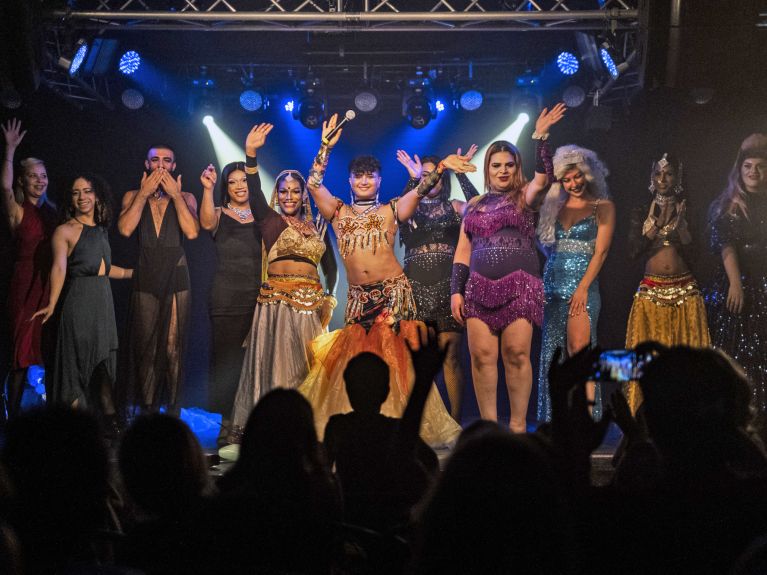Prince Emrah dances for queer refugees
Belly dancer Emrah was forced to flee his home country. In Germany he organises events for queer refugees and BiPoC artists.

As a young boy, Emrah would secretly put on his mother’s clothes and shoes and admire himself in front of the mirror. “What I liked doing most at family parties was dancing with the girls,” says Emrah, who is now 30. He especially liked belly dancing. “My parents weren’t keen at all. They didn’t allow me to dance at parties,” he says. When his family found out that Emrah was homosexual, they disowned him. Having gone to Turkmenistan from Azerbaijan at the age of three, Emrah then had to flee to Turkey to avoid a prison sentence. He lived in Istanbul for two and a half years before coming to Germany in 2015. Here he had the freedom to live openly as a non-binary personality. This means that Emrah no longer defines himself as female or male – and is happy to be referred to as either “he” or “she”.
He got off to a bumpy start in his new country of residence. “I didn’t know what to do with my life. I no longer had any contact with my family and I didn’t know anyone in Germany.” His passion was belly dancing, and this was what gave him strength. In December 2016, Emrah performed at a small festival for the first time. “I didn’t have enough money to buy a costume, so I quickly stitched one together out of my curtains,” he says with a laugh.

It was difficult for him to get gigs at first. “There isn’t much room for queer refugee artists,” he says. In order to stand out, Emrah opted for a new style with lots of glitter, extravagant costumes and headgear. The transformation worked. Emrah became better known and adopted a stage name: Prince Emrah. “Other refugee artists starting getting in touch with me more and more often,” he says. In 2018 he founded the QueerBerg Collective in Berlin to support queer refugees and transgender artists. The members regularly perform or curate festivals, parties and solidarity events.
The next step followed during the pandemic . Emrah founded the Black & Brown Cabaret. “Artists weren’t allowed to perform during the pandemic – all the bars and clubs were closed,” says Emrah. Restaurants were the only places that stayed open, subject to certain conditions. So he organised the cabaret in a restaurant with a small stage. Artists from different countries in the Middle East and Asia still perform there while people enjoy their meals.
After the pandemic, Emrah was asked to perform at major festivals, too. “But I only got to perform on small stages – the main stages were always reserved for other acts,” he recalls. So Emrah organised his own festival: the Whoriental Festival in Berlin, which sees itself as a “deliberate provocation and at the same time a place where people can come together”. The people on stage make a statement through their performance – whether in support of body positivity, empowerment or diversity. In September 2024, the festival will be extended to take place over a period of three days for the first time. The proceeds from workshops, performances, concerts, panels, drag shows and parties go to queer projects.
Emrah’s work is now getting noticed in other parts of the country, too. “In the Ruhr region there’s also a demand for this kind of space for queer refugee artists,” he says. Since 2023 he has organised the House of Namus, a series of events held at different locations. A festival of the same name was established in June 2024. Like Whoriental, on which it is based, it seeks to provide a safe place to party – especially for Muslim women and queer people.
Talking about his goals, Emrah says: “I want to give queer refugees the opportunity to find a new family in Germany and offer them hope for the future.”

